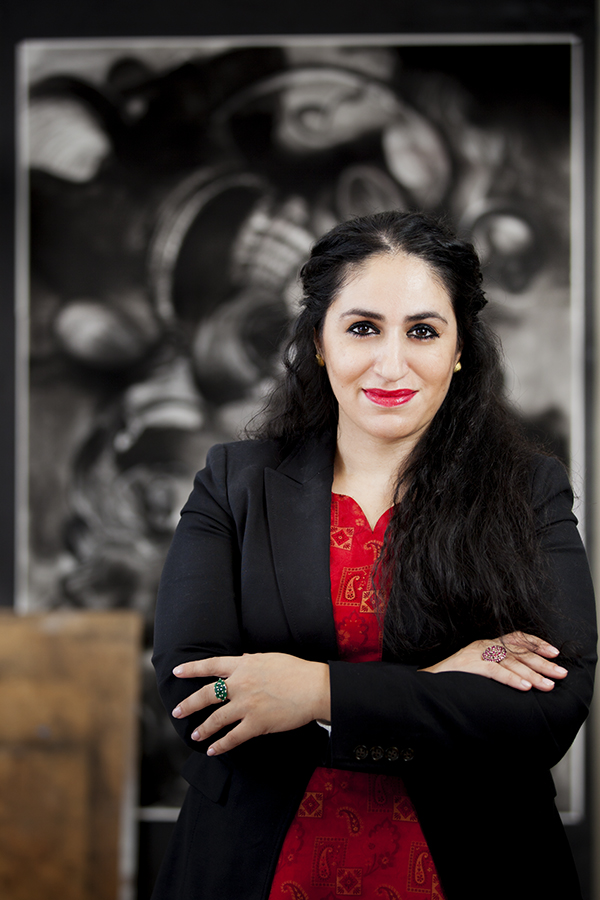Alumni
Farhana Mahmood Qazi ’96, Distinguished Humanitarian
Farhana Mahmood Qazi, ’96 is an analyst, writer, lecturer and a senior Pakistan instructor on the AFPAK Regional Training Team at Booz, Allen & Hamilton, where she designs multiple courses on Islamic civilization and all-things-Pakistan for U.S. government analysts and officers.
Open gallery

As the first woman to work for the U.S. government’s Counter Terror Center, Farhana has been an invaluable asset as a counter-terrorism analyst, providing much-needed insight into the Muslim world for her colleagues in the administration.
Farhana’s mentor, a former Pakistani ambassador to the U.K., says when he met her he was immediately struck by her intellectual capacity, passion and potential. This is not a surprise to one of her good friends who explains that people with the same name – Farhana – tend to be dedicated to building their lives on a solid foundation of order and service. The name Farhana in the Muslim culture also means joyful, happy and cheerful.
Today, colleagues say that Farhana’s ability to work across different cultures and religions, and her balanced understanding of extremist movements have aided in homeland security efforts and kept her fellow Americans safe.
One of her former professors at The George Washington University, who is now a colleague, says that by helping to clarify what at first blush seems inexplicable, Farhana has materially contributed to the betterment of mankind.
He adds that as a bridge between two cultures, she has skillfully and sensitively employed her rich and nuanced understanding of South Asian history, culture and politics to enhance the comprehension of policy makers and military combatants alike in dealing with this turbulent part of the world.
A former Dean of Students says that even as a student Farhana had a tremendous influence on others by promoting cross-cultural understanding through the founding of the Muslim Student Associations on campus. And a former professor says she taught him far more than he ever taught her.
Farhana brought and lived out her differences on the sheltered Southwestern campus in ways that enhanced all who were fortunate to be around her. She spent untold hours teaching others about her culture and her world. She changed people’s lives and world views.
Farhana venerates truth and knowledge and has risked her life to uncover both, so much so that the civilian affairs battalion at Fort Bragg, North Carolina, awarded her a badge of honor and certificate of appreciation for her work in preparing soldiers for deployment.
She also teaches Islamic history, civilization and post-9/11 challenges across different Muslim communities. When she’s not teaching, Farhana manages a publication called Amozesh—a Dari word for ‘training.’ The newsletter showcases the AFPAK instructional teams’ travels and training and features articles that give attention to the challenges and core issues in Afghanistan and Pakistan today.
A friend and associate says Farhana has always stuck to her goals and has been undeterred by criticism or naysayers, even as she sacrificed many of your own interests in order to understand the plight of others. Farhana has said that women in war fuel her passion for writing the untold story.
Farhana never stops questioning and always pushes for answers, giving a voice to the world’s hidden and oppressed in ways incomparable to any other. Driven by her strong sense of duty as a woman and an American, she is committed to helping the children of Kashmir. And, as a citizen of the world, she believes that standing up for those who are unable to stand up for themselves is a global imperative.
Described by her friends and colleagues as clever, fearless, thoughtful, sincere, dedicated, compassionate, poised, and fun … yet intense (in a positive way) … Farhana approaches the world and life with verve and elan that few can match.
And if all of her professional accomplishments didn’t speak enough to her character, Farhana is also known for her gentle demeanor and her dedication to her two children - Khalid and Maryam.
For “being Southwestern” on an international scale; for her ability as a natural story teller to lead her audience into the hearts and minds of her subjects; and for her undying work toward the betterment of humanity, The Association of Southwestern University Alumni presented Farhana Mahmood Qazi with its Distinguished Humanitarian Award for 2012.














